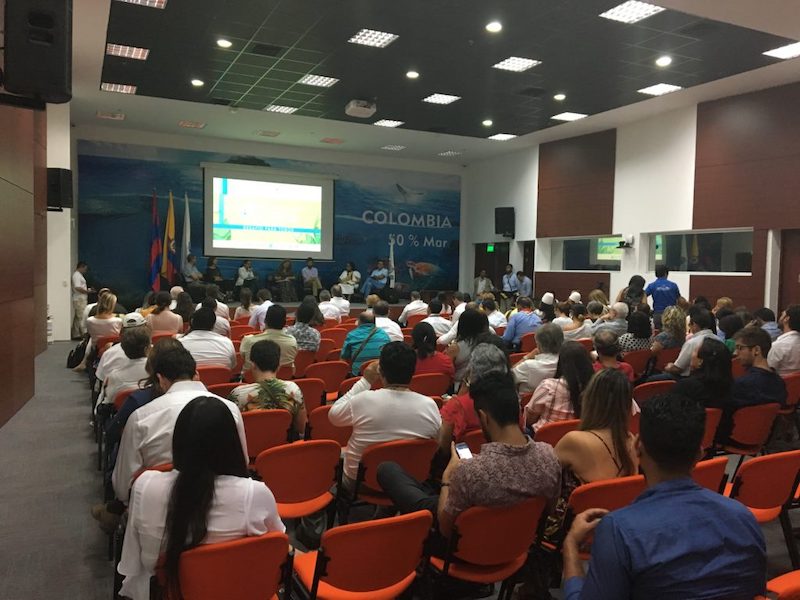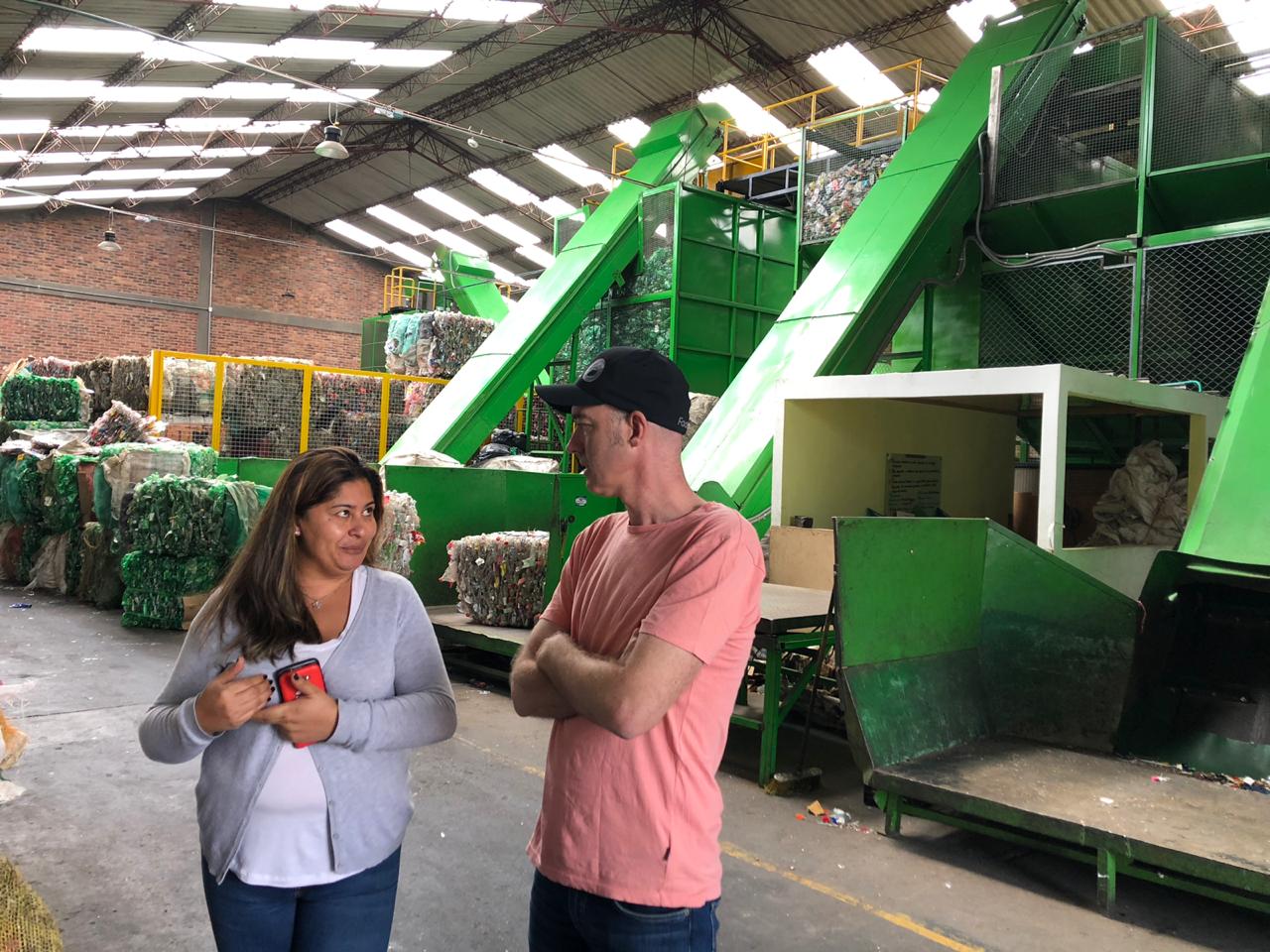With Craig Leeson, and Mariana Soto from Plastic Oceans Mexico, I attended the Single -Use Plastics, A Challenge for Everyone conference organized by the Columbia Attorney General´s office on Wednesday, April 3, in Santa Marta.

Conference: Single-Use Plastics, A Challenge for Everyone
Colombia is a country with about 50 million inhabitants, coastlines on the Caribbean and the Pacific Ocean, cities like Bogotá, Medellin and Cali. Unfortunately, they also have a river that is considered on the 20 most polluted rivers in the world – the Magdalena, which connects to the Caribbean.
Local Context
As the Executive Director of Plastic Oceans Chile, I have seen many different places with plastic pollution in my country. I have learned that although we all agree that plastic should never end up in our environment, and that there are very many different types of solutions, the reality is not that simple. It is very important to understand local context, because that will really define the most effective solutions that we can propose.
The invitation to this conference arrived at the right time for us to be able to compare realities between countries and see how far along Colombia is compared to its Latin American neighbors.

Angela and Willy of the Salva tu Río Foundation in Santa Marta.
The conference, held in beautiful convention centers with mostly an already sensitized audience, almost made me forget about how this pollution has come about and why. Of course, I came to talk about plastic pollution but did not just want to visit Colombia only for that, and take the plane home the next day. So, when I received this invitation from our contact at the Attorney General´s office, Mauricio Gonzalez, I asked him to help me out to see as many situations and projects as possible… and I can say that he more than kept his promise, making this an invaluable trip.
I got to see separation plants, contaminated rivers, meet native people, see places without drinkable water, and mobile phone app developers. I made friends and ended up in the Colombian congress to talk with a congressman about a possible nationwide ban on all disposable plastics.
Recycling in Colombia
In this blog I would like to focus on recycling in Colombia and what I managed to learn about it during the trip. This business in
Colombia by now is a million dollar industry that works with about 60,000 waste pickers all over the country and generates more formal (and informal) employment every day. They fully depend on this industry to make a living. These waste pickers are key in the current recycling economy, and for the transformation towards a circular economy. Thanks to them a big part of national territory is covered, increasing the recycling rates and guaranteeing volume of post consumer plastic products, making recycling a sustainable business over time.
Ekored
We had the chance to share the entire week of our visit to Colombia with Juan Carlos Gutierrez, general manager of Ekored; the biggest PET recycler in Colombia. He recycles over 3,000,000 PET bottles a day and turns them into yarn and recycled pellets for the soda industry.

Luz Marina Gutierrez, manager of the plant, explaining to Mark the operation of Ekored in Bogotá
Their headquarters is in the city of Medellin, but he has sorting sites around the country, with the biggest being in the capital of Bogotá.
I met Juan Carlos when he shared his vision and experience at the expert panel at the conference. He also went with us to see the Manzanares River in Santa Marta and accompanied us to the congress to meet with Congressman Juan Carlos Lozada.
In the separation station of Ekored in Bogota we learned a thing or two about recycling conditions in Colombia and how it could be so much more efficient than it currently is. We are talking about a few small adjustments that could drastically increase the recycling rates and quality of the material. Currently in Colombia 31% of PET is being recycled.
Challenges
Problem number one in Colombia is that one of the favorite national drinks ‘Pony Malta’, a barley malt based soda, distinguishes itself by using a brownish kind of PET bottle, or locally called ‘Amber PET.’ As it’s the only brand that uses that color, recycling their bottles has only one way out: selling it back only to them because it can’t be mixed with PET of another color.
Painted Labels
The second problem, which is one that we already heard from before when we visited the Chilean city of Antofagasta in 2018, but we thought it was only a Chilean problem, are the returnable bottles with painted labels on them. I imagine that painting labels is to save costs and to save the process of printing labels and sticking them to bottles and having to reapply them after every wash (if someone knows if there is another reason please let us know!). The decision to paint labels onto bottles has grave recycling consequences, because the paint makes that part of the PET bottle unfit for recycling as the paint mixes with recycled content and contaminates the batch. The label makes up maybe 20% of the bottle, but in general the bottles are cut in half, one half goes to recycling and the other half to landfill.
Plastic Labels
The third problem is the plastic labels. At the moment most soda companies use 2 different types of full-color labels on their bottles. Although the used images and colors are almost identical, the type of plastic used is not. One label is made of Polyethylene and the other is made of PVC. It’s a design choice, one with high environmental consequences because PVC labels cannot be recycled and end up in the trash…….. millions of labels every day.
Why Recycle
As we already know, we cannot recycle our way out of the plastic pollution problem, we need to reduce our consumption as soon as possible. However, in the mean time, while we still have not moved away from disposable plastic products, recycling is what we have and we are not doing it in a very efficient manner. Projects like Ekored are important for this transition to a circular economy, because of the way they operate and also because all the jobs they generate directly and indirectly.
Towards a Circular Economy
Recycling is an intermediary phase, a transition towards an economy where we generate LESS waste and do not have the need to recycle every single use and disposable product. Simple decisions about how to apply labels and the type of plastic we use for these products have a big impact on the efficiency of the current recycling system. Companies need to take responsibility for the materials they use and how they could make the system work better and WE as consumers need to inform ourselves about the products we buy and demand alternatives.
We cannot let uninformed design decisions keep obstructing recycling processes and add more waste to landfills. We prefer that this be solved in a collaborative and responsible way, through transition, like what we are working on as members of the board of the Chilean Plastic Pact. Time is running out and only if we all work together we can solve this global crisis… It’s up to us to do it.
###

Trackback: Magic mushrooms Italy delivery
Trackback: autodetailing
Trackback: https://stealthex.io
Trackback: ระบบประตูทางเข้าหมู่บ้านอัจฉริยะ
Trackback: ทางเข้าpg
Trackback: wings789